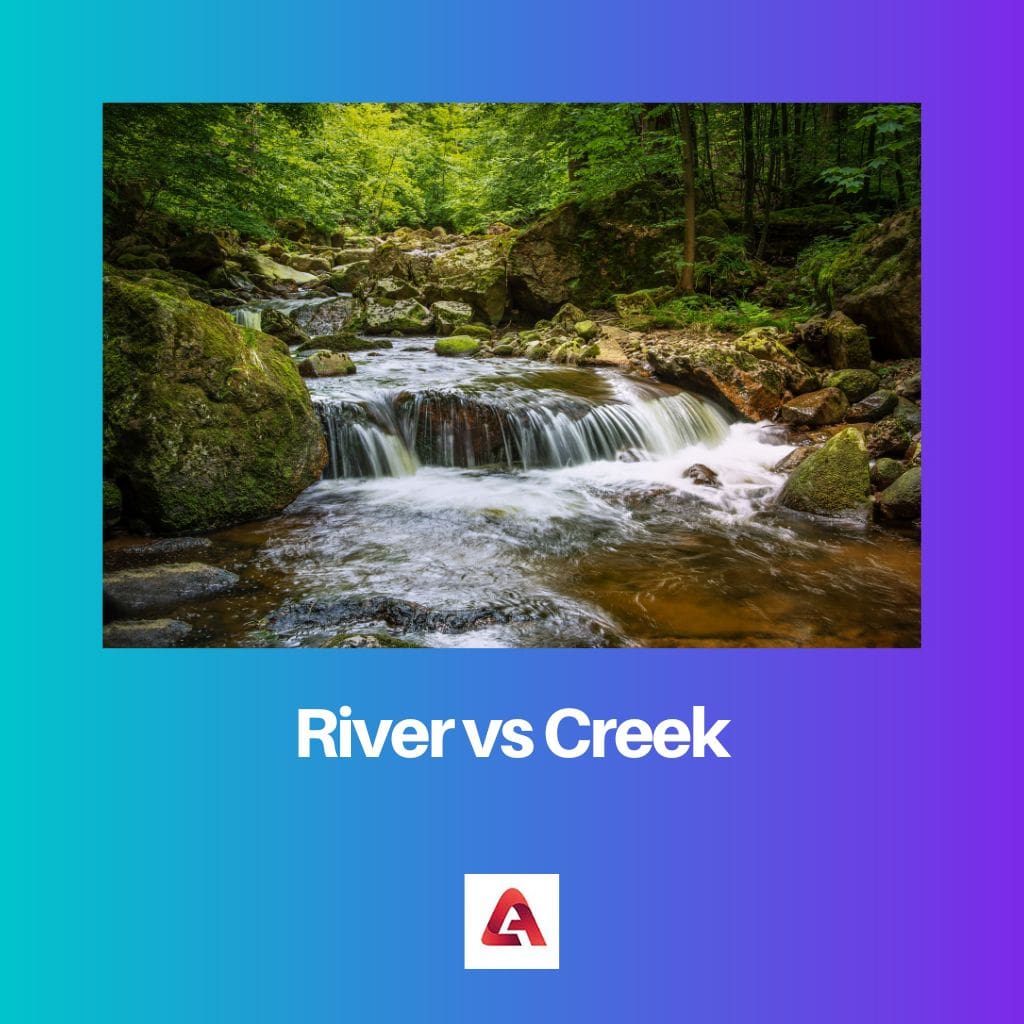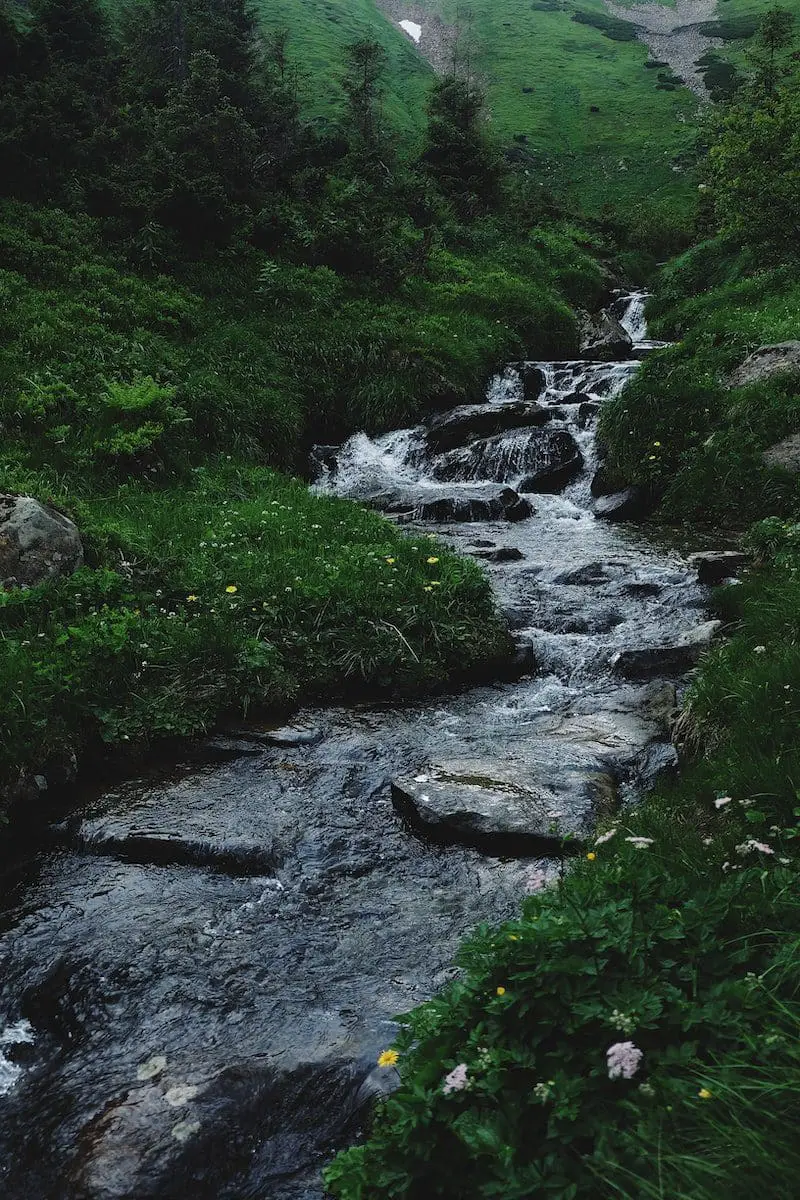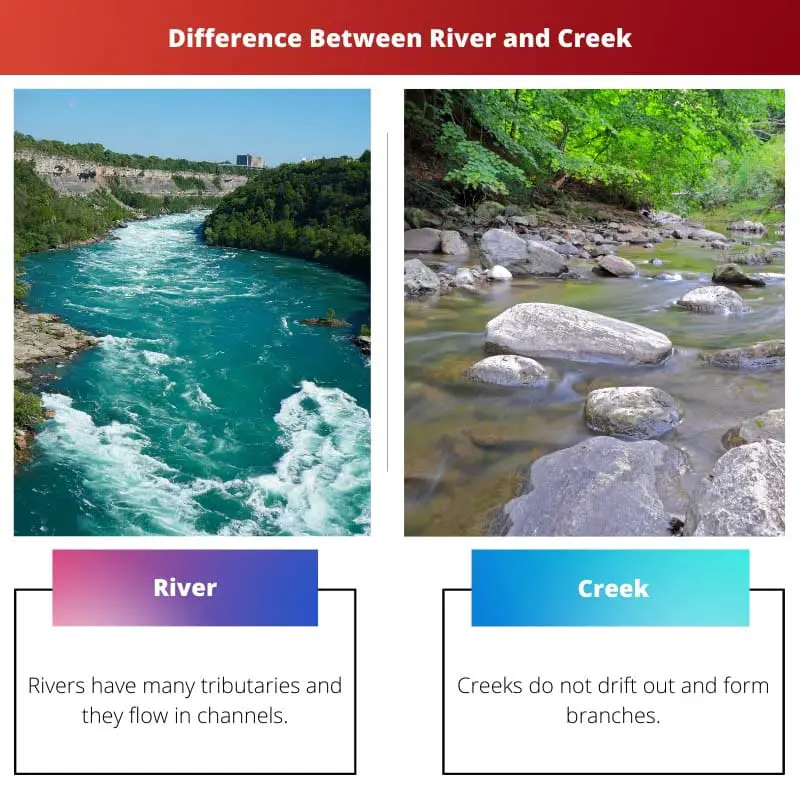Most of the surface of the earth is covered with water. These water bodies can be in different forms and sizes.
An accumulation of water on the earth’s surface is known as a water body. The different forms of such water bodies include lakes, rivers, oceans, creeks, ponds, and wetlands.
Oceans are the largest among these.
Some water bodies may be artificial, while others may be naturally occurring. Rivers and Creeks are names for the water flowing on the earth’s surface.
These two interesting water bodies are almost identical, making it difficult to differentiate them. Both of these water bodies aid the circulation of the water on the earth’s surface.
They also serve as habitats for many lives, including animal and plant species. However, there are a few differences between both of these water bodies.
Key Takeaways
- Rivers are larger, deeper, and wider bodies of water with a significant flow of water, originating from various sources like glaciers, springs, or rainfall and ultimately draining into oceans, seas, or other larger bodies of water.
- Creeks are smaller, narrower, and shallower watercourses that are tributaries of larger bodies of water, such as rivers or lakes, and may dry up during periods of low rainfall or water supply.
- The main distinction between rivers and creeks is their size, depth, and flow, with rivers being larger and deeper watercourses, while creeks are smaller, shallower tributaries.
River vs. Creek
Rivers are larger bodies of water that flow from higher to lower elevations, towards the sea or a larger body of water. Creeks are smaller bodies of water that are narrower and shallower than rivers and may dry up completely during periods of low rainfall.

Comparison Table
| Parameter of Comparison | River | Creek |
|---|---|---|
| Size | A river is larger and deeper than a creek. | A creek is shallower and mostly smaller than a river. |
| Appearance | Rivers have many tributaries and they flow in channels. | Creeks do not drift out and form branches. |
| Sea | Rivers mostly flow to the sea. | The water of the sea may establish creeks. |
| Generation of power | Rivers can be a source of power generation. | Creeks lack sufficient power to be tapped for power generation. |
| Transportation | Rivers being huge, serve as a great means of transportation. | Creeks being shallow and small in size, cannot be used for transportation. |
What is a River?
A river is a water body, like a ribbon, that flows downward, originating from high mountain ranges, snowpack water, glaciers, or other natural sources. The water in the river can be filled by melting glaciers, snowmelts, or even by the rains.
Rivers run for many kilometers and end at the seas or oceans.
The source, also known as the headwater, is the point at which the river starts, and the mouth is where the river ends, the ocean or sea. Current is the water movement in the rivers.
Sometimes in the hot seasons, the river water dries, and hence the size of the river varies. A few rivers flow throughout the year, while some flow during heavy rains and certain seasons.
The Amazon and the Nile are the longest rivers in the world, and they flow through many countries, running for a thousand miles.
The rivers have freshwater and serve as a habitat for various living creatures. They are an important source of living for human life, and without rivers, life might not have been possible.
A few advantages of rivers include:
- Rivers help in power generation.
- They also help to transport heavy objects and goods.
- Farmers use the water of the river for irrigation and agricultural activities.
- Rivers help to make the land fertile by soil erosion.
- They help to carry and transport nutrients and water all around the world.
- Rivers also serve as a source of drinking water.
- They can be used for boating, swimming, and other leisure activities.
Rivers also have a few disadvantages:
- Dumping of agricultural wastes into the rivers makes the water fatal and is also dangerous for marine life.
- The factories also dump chemical wastes into the rivers, which affects human and marine life.
- Sometimes rivers also cause floods, destroying crops and making many people homeless.

What is a Creek?
A creek is a small stream or a water body that is small and shallow. They are known as a branch of a river.
They do not drift out and form tributaries or branches.
The word ‘creek’ has slightly different meanings in different countries. In Australia, New Zealand, and North America, creeks refer to small streams.
A narrow inlet or passage to the sea is called a creek in India or the United Kingdom.
A few advantages of Creek include:
- Creeks serve as a livelihood for marine life.
- The water in the creek can be used for agricultural activities.
- Creeks are also a source of drinking water
Creeks also have a few disadvantages:
- Creeks are small, so they cannot help with transportation.
- They cannot help to generate power or electricity.
- Dumping of wastes into the creeks makes it hazardous for humans and marine life.

Main Differences Between River and Creek
- The word ‘creek’ is mostly used for large water bodies. However, a creek is shallower and smaller than a river, a big water source.
- Rivers have many tributaries and branches, and they flow in channels. On the other hand, creeks do not form any branches. They can sometimes be a branch of a river.
- Rivers are water bodies that flow to the sea, while the creek is a water body that the sea may form.
- Rivers are a huge water source and help transport heavy objects, whereas creeks are small and cannot transport objects downstream.
- Rivers can generate power, which is not in the case of creeks. They are too small to generate power.


I enjoyed the comparison between rivers and creeks. It was quite interesting to learn the distinctions between these water bodies.
The comparison table provided an easy reference to understand the differences. Great addition to the article.
This article was quite informative. It laid out the key differences between rivers and creeks, and how they’re important for the environment. It’s nice to see a detailed explanation of these water bodies.
Yes, the information was presented in a clear and concise manner. I’ve learned a lot from reading this article.